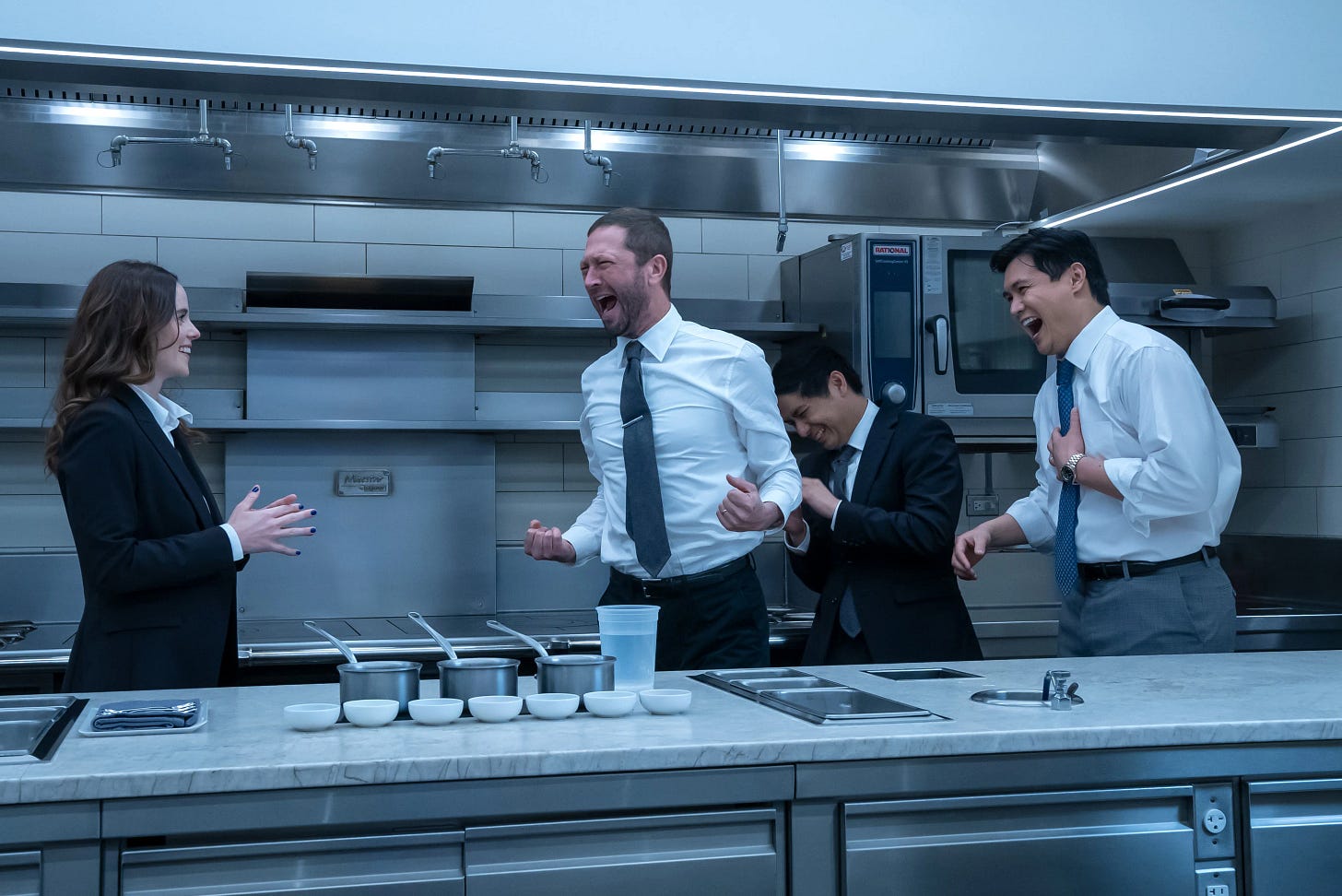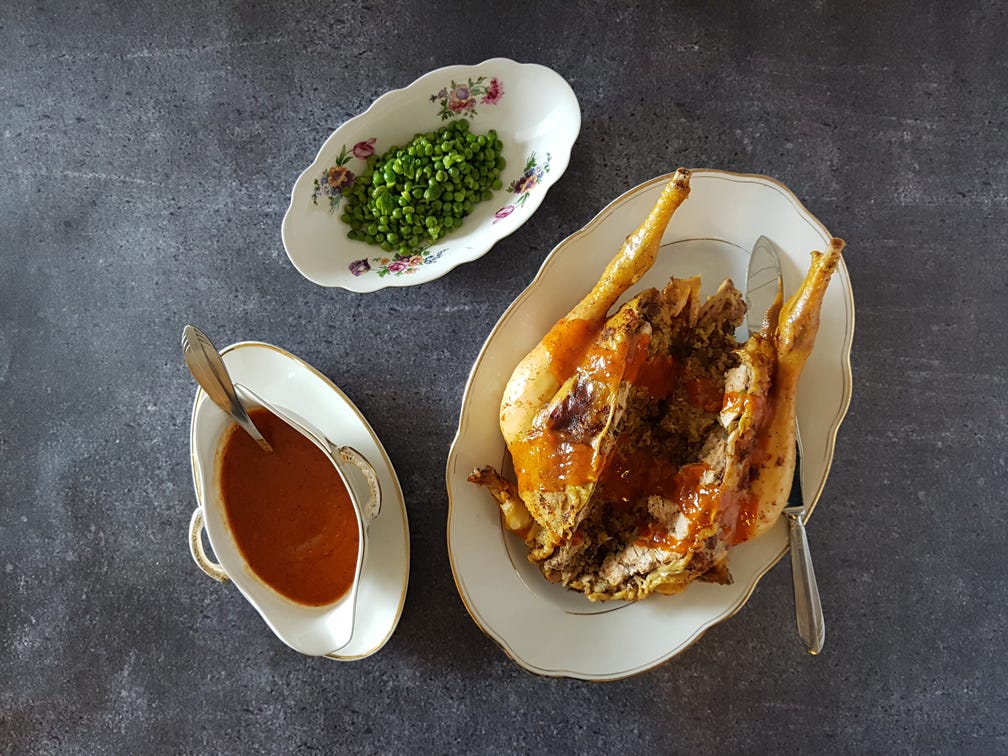
No through-line on this post; just a rundown of things I’ve either been meaning to get to and haven’t, or things that I think are worth sharing but don’t need a full treatment. To be honest, this genre of newsletter’ing is the most prone to navel-gazing, over-sharing, and general redundancy — who needs another person recommending the same TV show everyone else is already watching?
Still it may prove useful to me as a way of organizing my thoughts and combating my penchant for preciousness — and I’ll probably do it more going forward. Take what interests you and leave the rest.
Wednesday is like if My Bloody Valentine was a Drive-By Truckers cover band. I can’t recommend them more highly. Hopefully I’ll write more later.
For now I’ll say that if their most recent album, Rat Saw God, had been released in 1995 — sometimes it sounds like it — the belly of my CD would’ve been as pocked, scored, and cratered as lunar crust. No doubt I would’ve had to buy a new copy. Instead, my total streams have probably netted the band about $0.27 in pre-tax royalties. Three cheers for digital media!
The above single, “Chosen to Deserve,” is relatively straightforward as far as songs about ingesting too much Benadryl go. “Bull Believer,” the nearly nine-minute second track, is not quite like anything I’ve ever heard.
Susan Straight’s map of 1,001 American novels is very cool, and a great resource for summer readers with a regional inclination. (Which would include me.) I’m sure there are similar projects out there, but I’m not aware of any that match this one in terms of ambition or exuberance.
Yes, The Bear is as good as everyone says it is. Yes, the one-two punch of “Fishes” followed by “Forks” is as good everyone says it is.
For the show’s surprising emotional range, insights on the complicated business of “doing what you love,” increasingly large character ensemble, and possible over-reliance on nevertheless-awesome needle drops, I’d argue that The Bear is what Ted Lasso might’ve been, and occasionally was, if Apple hadn’t gotten in the way. (I’m making some assumptions there, but I think they’re valid.)
I’d also argue that for the show’s warmth, honesty, good will, good faith, capacity for ambiguity, and a half-dozen other virtues, The Bear is an uncannily effective rebuke to The Menu, last year’s sendup of haute cuisine, which I maintain is one of the stupidest things I’ve ever seen on a screen (literally any screen). To be clear, I’m aware that this overcooked T-bone of nihilism has its fans, but I will not be persuaded! And, no, I don’t watch Chef’s Table. But, yes, I get that the filmmakers are doing a real number on Chef’s Table. And, yes, I’m aware that Noma — a restaurant which is among The Menu’s targets, and also where Carmy is supposed to have worked — closed last year due to the “unsustainable” nature of fine dining. And, yes, I’m aware that its closure likely had something to do with the restaurant’s notorious work environment, which apparently reached weapons-grade toxicity. But, no, I don’t think that vindicates or justifies The Menu: a movie that feints at beheading bourgeois hypocrisy but in fact embodies bourgeois hypocrisy; a movie whose characters are uniquely self-serious and therefore, as we learn over the course of the story, uniquely miserable; but a movie whose creators are just as self-serious and, worse, suffer from a more insidious and damning comorbidity: self-satisfaction.
But back to The Bear!
What a season! Some awards:
Best Dish: Sydney’s omelet with potato chips sprinkled on top. Try it.
Best Guest Star: John Mulaney. People prone to fabricating parasocial relationships are down on Mulaney for unclear reasons, but I can’t claim to care much. A Chicago native, Mulaney’s sincerely dumbfounded reaction to the mayhem of the Berzatto family Christmas dinner offers the audience at least a fleeting hold on normal human behavior. I kind of think he’s barely acting.
Best Quote: It’s a tie, but they’re both from Richie.
I'm not like this because I’m in Van Halen. I’m in Van Halen because I’m like this.
On mold:
I will grant you that it’s gained some traction in recent media cycles.
Best Song: I surprise myself, and I’d love to give the nod to Bruce Hornsby, but it’s “New Noise,” by Refuse, which alongside Wilco’s “Spider (Kidsmoke)” has become a show staple.
But really, what a soundtrack! Irresistible to a certain kind of white guy — i.e., me. Ten minutes into the new season, my wife turned to me and said, “The music supervisor on this show sounds like he got into the shower with you.” Well if that’s the case —
On the subject of cooking, I was reading Richard Sennett’s The Craftsman recently, and one segment stood out in particular. Sennett is using the craft of recipe writing to demonstrate the importance (and difficulty) of providing good instructions. (The “transmission of knowledge” from master to apprentice, expert to novice, etc., is a major theme of the book.)
He takes as an example the French dish poulet à la d'Albufera, a boned chicken stuffed with rice, truffles, and foie gras, and coated with a sweet pepper sauce. In short, a demanding dish for anyone, let alone someone who’s never cooked it before.
The first recipe he cites is by Richard Olney:
Sever the attachment of each shoulder blade at the wing joint and, holding it firmly between the thumb and forefinger of the left hand, pull it out of the flesh with the other hand . . . Force the flesh loose from the breastbone, working along the crest with the point of the knife and forcing that at the sides loose with fingertips. With fingertips, loosen all the way around the rib cage, and finally, at the highest point of the breastbone, cut through the cartilage connecting it to the skin, being careful not to pierce the skin.
On first glance, the copy seems clean and direct. But there’s the rub. It is too clean, too direct. “Many unfortunate chickens will be hacked to bits if a beginner follows it.” The recipe suffers from the same issues that plague Ikea instructions: “accurate but serviceable only to someone who has already put the piece together.”
Sennett offers three superior examples. The first is by Julia Childs, whose instructions emphasize what he calls “sympathetic illustration.” (You can imagine what this means.) The second is by Elizabeth David, who uses a narrative approach. But, for me, by far the most evocative and memorable method is by Fatima Benshaw, whose instructions reinforce the stupendously weird power of metaphor.
A Persian refugee who taught Sennett cooking classes, Benshaw’s English was poor, and she didn’t always know the names of the ingredients she’d picked up in the market. Nor did hands-on instruction work — she moved too fast for her students to follow. Instead, Sennett asked her to write down her recipe for poulet à la d'Albufera as best she could. She agreed, and after working on it for a month, produced this:
Your dead child. Prepare him for new life. Fill him with the earth. Be careful! He should not over-eat. Put on his golden coat. You bathe him. Warm him but be careful! A child dies from too much sun. Put on his jewels. This is my recipe.
I bought the new David Grann book for my dad, for Father’s Day: The Wager: A Tale of Shipwreck, Mutiny and Murder. A staff writer at The New Yorker for two decades, Grann has written about Sherlock Holmes, the birth of the FBI, British colonialist misadventures in the Amazon, and a handful of other subjects that tend to attract dads. All that’s to say, my dad already had this book, so I regifted it to myself.
I finished The Wager in a weekend, and I’m not a fast reader. It’s excellent. Beyond Crusoe and Melville, whom Grann draws on to set the scene, I kept thinking of Werner Herzog’s Aguirre, Wrath of God, another story in which imperial dreams of wealth and power spiral into anarchic nightmares of privation and madness. In particular, I thought of the film’s unforgettable opening sequence. “The history of human folly in little,” as Matt Glasby puts it.
Martin and Leo — whose adaptation of Grann’s last bestseller, Killers of the Flower Moon, is set to premiere later this year — also have the rights to The Wager.
I say: make it hap’n, cap’n.
Inspired by swashbuckling epics of the high seas, but less inclined to reopen Moby Dick, I picked up a Joseph Conrad collection, Typhoon: And Other Stories, for a beach trip next week.
We’ll be driving through a string of small towns on the way there — and as mentioned, I get into a regional, usually Southern reading mood in the summer — so I’m also reading The River of No Return, Cleveland Sellers’s autobiography. Originally from the tiny hamlet of Denmark, South Carolina, Sellers was a key figure in the Student Nonviolent Coordinating Committee (SNCC) and wrote The River of No Return while in prison on bogus charges following the Orangeburg Massacre1.
We’ve made this trip several times over the last three years, which takes us through Orangeburg and just north of Denmark, and every time it’s easy for me to slip into a kind of backroads, drive-by tourism, or perhaps voyeurism, that vacillates between two poles: the sentimental and the skeptical. The sentimental pole sees quiet streets, patinated brick storefronts, and rambling old Victorian homes, and dreams of something quaint and charming and sadly lost. The skeptical pole sees abandoned state highways, boarded-up town squares, and a derelict shotgun shack in the backyard of a Wendy’s, and thinks good luck, or on first viewing of a Confederate flag, good riddance.
Of course both poles are wrong. Towns like Denmark and Orangeburg are more than mere sites — i.e., abstract locations — and more than mere sights — i.e., things to look at. The only just way to treat these towns is to treat them as places, to recognize their concrete existence in the past, present, and future. Real places, with real people, living real lives, ordinary and extraordinary, like Sellers.
Now, only a scoundrel or a solipsist would deny any of this. But how do we act on these truths, which we hold to be self-evident, in a meaningful way? Empathy has become a charged and controversial word. I don’t know. If empathy is only measured by the empathizer, perhaps it’s too subjective to be of any use. It seems we need a better way to recognize what’s real and what’s not, or what matters and what doesn’t. Books are at least one way to fight the undertow of unreality. Not a particularly innovative prescription, but a prescription. Certainly not the only way, probably not the best way, but a way. Ignorant soul that I am, I might never have heard of Cleveland Sellers, and might never have given much thought to Denmark or Orangeburg, South Carolina, if not for a book I read this time last year by Charles Marsh called God’s Long Summer.
Books — hey, they’re a start!
That’s all for now. As always, feel free to send exclusively adoring feedback to happfew@substack.com, and share the newsletter with a friend, enemy, frenemy, co-conspirator, or long-lost crush.
I reckon the next edition of The Happy Few will be in two to three weeks, post-vacation.
Y’all be good, now.







P.S. please follow me back on the gram so that I’m not relegated to just fanboy-ing over your work here. And say hi to Jett for me the next time you see him. Thanks
Great article, jordan. I started listening to Wednesday after reading and found myself at an MJ Lenderman concert within a week. Appreciate the rec! And, yeah, I like drinking too. - Lawfirm